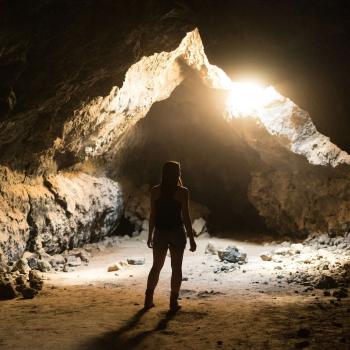We will not hide them from their children, but tell to the coming generation the glorious deeds of the LORD, and his might, and the wonders which he has wrought. He established a testimony in Jacob, and appointed a law in Israel, which he commanded our fathers to teach to their children; that the next generation might know them, the children yet unborn, and arise and tell them to their children, so that they should set their hope in God, and not forget the works of God, but keep his commandments.
--Psalm 78:4-7
Architect and catechist Christian Le Blanc is wearing a suit and tie and standing in front of a group of 15 sixth graders at St. Mary's parochial school in Greenville, South Carolina. It's the beginning of the catechetical year on a warm Wednesday evening in September, and a noisy crowd of raw recruits has just shuffled in and slumped into chairs, worn out from a long day at school.
Before they can droop any further, he engages.
"Hey y'all, welcome to 6th grade Wednesday Night Sunday School. This is your textbook. I don't want to see it again."
"WHAT?"
"Take it home, there's no time in class to be reading from the textbook; I'll let you know each week what you ought to read for next week's class, as in: read it at home."
An outburst of objection to this flouting of rules is quieted with the cool-eyed reassurance: "This year is the opposite of last year. Don't worry, you'll get used to it."
Now they're sitting up a little straighter.
"Now, who likes parties and crafts and games?"
"I do! Me, too!" they chorus, eyes brightening.
"Okay," he says, quickly, "you are going to be miserable this year. We won't have any time for that stuff, there's too much to learn. Yes?"
"No parties?" they gasp.
"Nope. Look here's what I want y'all to do this year [on the board]: SUFFER."
Nervous giggles.
"Suffer?"
"Yes, suffering is good, and I'm the meanest teacher in Sunday School. Yes?"
"My brother says he really didn't suffer last year and he had fun."
"Oh. Well, he was supposed to suffer. If you do have fun in here it'll be a miracle, but keep it to yourself. Don't spoil the suffering of others. Hey there, daughter, stop smiling!"
It's only 6:35 and he has them laughing, engaged, arguing with him, and yes, paying attention. The learning quickly follows with Chapter One of Genesis, in a flurry of storytelling, scriptural references, explorations of deeper meanings via English, Spanish, Latin, Hebrew, Greek, classic art reproductions, cartoon drawings, practical and moral applications, personal witness, creative dramatics, and lots of comedy. They've been guided into guessing right so many times they think they're Bible geniuses.
When the hour is up, they are intrigued, excited, and armed with enough food for thought to begin to effectively engage their families and friends outside of class. When the year ends, they will have truly learned 50 Bible stories, and acquired a thoroughly Catholic appreciation of the progression of Salvation History culminating in Jesus Christ and the Holy Mass.
"From the get-go they learn that the body and soul are an integral unity," he says, drawing a parallel to what he does with scripture. "Catholicism and the Bible are not separate realities. The Bible is the literary manifestation of Catholicism."
But he doesn't teach the entire Bible. "It's not comprehensive or exhaustive. We're just skimming the tops to see how the Bible works, providing a Catholic framework."
Raised in Louisiana in a totally Catholic environment, Christian says, "I didn't know there was a single human being that wasn't a Catholic. On Good Friday, everything closed."
But at the age of eight his family moved to South Carolina. "I went through terrific culture shock. From that point on I was percolating in a much more explicit Bible culture than in Louisiana and it became an integral part of my evolving world view."
Married for 24 years, a father of 5 and grandfather to 2, Christian and his wife, Janet, an Art History professor, had been teaching RCIA since 1999 using a Bible-based program they created themselves (with their pastor's permission). But when he was asked to take on the sixth grade eight years ago, he was annoyed:
"I did not want to deal with kids: what do they care about the Council of Nicaea? But God does work in mysterious ways. I was wrong to think I'd have to dumb things down for them. Sixth graders are still very open to learning about God, their brains are nimble, and you can move along at lightning speed, changing references and jumping from Abraham to David to Christ in a heartbeat."
So, using a program designed for adults, Christian began to find his way with the kids. "Unlike the adult class, where I could just give a verse or two, and rely on individuals to already know, or check, the bigger passage on their own, the kids needed more context. For example, if I were discussing baptism with adults, I could just summarize Naaman and Elisha; but with the kids, I needed to tell the whole story. In fact, I wound up acting the story as much as telling it, which was great fun, and the little brains soaked it right up."





